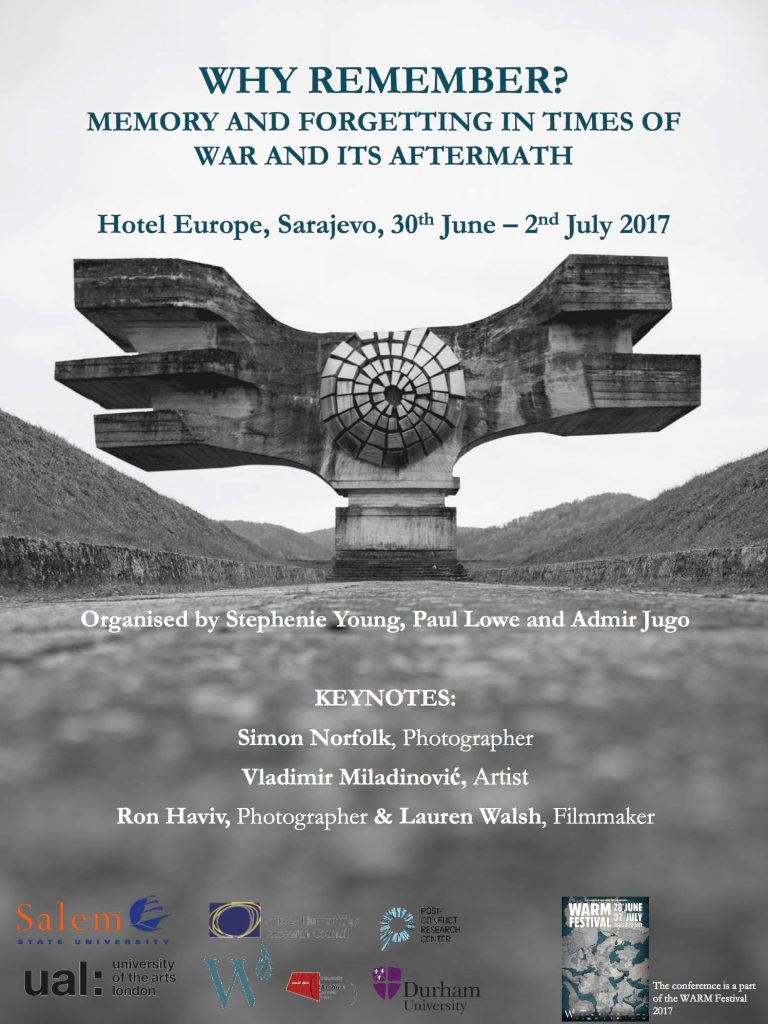‘Why Remember? Memory and Forgetting in Times of War and Its Aftermath’
Sarajevo, 30th June – 2nd July 2017
ORGANIZING COMMITTEE
Dr Stephenie Young (Salem State University)
Dr Paul Lowe (London College of Communication, University of Arts London)
Admir Jugo (Durham University)
The conference is part of the WARM Festival 2017
The conference was generously supported by: Center for Holocaust and Genocide Studies, Salem State University London College of Communication, University of Arts London
PROGRAMME
Friday, June 30, 2017
9:00- 9:25
Welcome and Opening Remarks by Dr Stephenie Young, Dr Paul Lowe, and Rémy Ourdan
9:30 – 11:00
Panel 1A
Making Images, Unpacking Archives: Visual Methodologies, Memory and the Production of Alternative Bodies of Knowledge in Contemporary Spain Organizers: Lee Douglas and Zahira Aragüete-Toribio
Chair: Stephenie Young
Zahira Aragüete-Toribio (University of Geneva) (co-author: Jorge Moreno Andrés, UNED)
Narrating Exhumation Processes through Film in 21st Century Spain
Lee Douglas (CCHS-CSIC)
To Stand Watch, to Remain Vigilant: Photographic Practice and the Production of Knowledge
Lidia Mateo Leivas (CCHS-CSIC)
Remembering through Clandestine Images: Expanding the Scope of Visibility in Spain and Beyond
María Rosón Villena (University of Valencia)
Post-War Spain and Personal Photography: Affect, Agency, and Memory
Panel 1B
National Memory
Chair: Tiffany Fairey
Dean Peachey (University of Winnipeg)
I Never Want to Forget What Happened, But I Don’t Want to Always Be Remembering It
Angela Boone (Independent Researcher)
The Unwanted Remembrance of the Dutch as Culprits instead of Victims
Michael S. Drake (University of Hull) The Ends of Commemoration: Centenary Remembrance of the British First World War Dead
11:30 – 13:00
Panel 2A
Memory and Forgetting
Chair: Admir Jugo
Maria Kobielska (Jagiellonian University)
Multidirectionality, Junctions, and Conflicts: In Search of Multidirectional Memory in Poland
Olga Burkhardt (University of St. Andrews)
Forget, Forgive: Conclude and be agreed? Negotiating Memory and Forgetting after Mass Atrocity and Genocide
Lejla Gačanica (University of Mostar)
History Repeats Itself: Memories of the Post-War Generation
Carol Mancke (Royal College of Art, London)
At the Table: Collective Re-Membering
Panel 2B
Contemporary Trends in Memory Studies
Chair: Lauren Walsh
Jennifer Good (London College of Communication)
Photography of 9/11: Remembering, Repeating and Working Through
Keith Weller-Taylor (Cornell University)
Remembering the Vietnam War and Narrating Contemporary American and Global History
Katherine Bailey (Lancaster University)
Memory in Guatemala: Remembering the Disappeared
Iryna Shuvalova (University of Cambridge)
Making the Past Trendy: Remembrance or Forgetting? The Case of the Omnipresent Cossacks
14:00 – 15:00
Keynote: Simon Norfolk
15:15 – 16:45
Panel 3A
The Question of Public Memory
Chair: Admir Jugo
Denisa Kostovicova (LSE) and Tom Paskhalis (LSE)
The Voices of Reconciliation: A Gender Perspective on Transitional Justice in the Balkans
Jessica M. Smith (GMU)
Power, Politics, and Public Memory in the Aftermath of War: Elevating Marginalized Narratives Using Photovoice
Tiffany Fairey (University of the Arts)
Why Remember? Why Reconcile? Exploring the relationship between memory and reconciliation through arts projects in Latin America
Carol Schaeffer and Helen Ratté (Independent Researchers)
Tamo mi je bolje, ali ovdje mi je ljepše: Return, Resettlement and Memory Between Germany and Bosnia
Panel 3B
Aesthetics and Truth
Chair: Paul Lowe
Manca Bajec (Royal College of Art)
Nothing Monumental Can Ever Come of This
Katrin Paehler (Illinois State University)
The District Six Museum in Cape Town, South Africa: A Three-Dimensional Yizkor Book?
Barbora Knappová (Charles University)
Promises and Limitations of Post-museum as a Model Institution for Reconciliation: The Case of History Museum of Bosnia and Herzegovina in Sarajevo
Saturday, July 1, 2017
9:00 – 10:30
Panel 4A
Memoryscapes
Chair: Stephenie Young
Carole Evans (Ravensbourne)
The Landscape of Conflict: An Exploration into the Memory of Landscape in Photography.
Paweł Starzec (University of Warsaw/Institute of Creative Photography of Silesian University in Opava)
Scratching the Surface: Photographing the Violence Altered Landscape
Liliana Gómez-Popescu (University of Zurich)
Contested Amnesia and Bodies of Pain: Contemporary Visual Arts in Colombia and Lebanon
Panel 4B
Architectural Limits of Memory
Chair: Paul Lowe
Kenneth Morrison (DeMontfort University)
The War Hotel as a Locus of Memory
Harnoor Bhangu (University of Winnipeg)
The Partition Museum: Encountering Difficult Knowledge and Drawing from the Well of Postmemory
10:45 – 12:15
Panel 5A
Ethics and Education: Engaging the Present with the Past
Chair: Rachel Kerr
Fiorenza Loiacono (University of Bari)
When the Ritual Remembering is an “Empty Shell”: The Case of the Shoah in the 21st Century
Olga Dror (Texas A&M)
Creating Memories in Time of War: What South and North Vietnam Wanted Youth to Know about History
David Savill (University of Salford)
The Ethics of Appropriating Cultural Memory in Fiction
Panel 5B
Writing Memory
Chair: Admir Jugo
Dani Nassif (University of Münster)
A Literary Model for Derridean Mourning: Confessions and the Missing of the Lebanese Civil War
Mehnaz M. Afridi (Manhattan College)
Mourning, Memory, and Nostalgia within Genocide(s)
Luisa Maria Flora (University of Lisbon Centre for English Studies, Lisbon University)
Helping Strangers: Neutrality and Moral Responsibility in Rose Tremain’s The Gustav Sonata (2016)
13:15 – 14:15
Keynote: Vladimir Miladinović
14:30 – 16:00
Panel 6A
Artistic Interventions and Memory
Chair: Kenneth Morrison
Petra Hamer (University of Graz)
This was Once Popular: A Case Study of Sarajevan Patriotic Music
Claudia Zini (The Courtauld Institute of Art)
Objects of Memory. Autobiographical Survival Strategies in Post-War Bosnia and Herzegovina.
Hariz Halilovich (RMIT University, Melbourne) (co-author: Adiz Fejzić, Queensland College of Arts, Griffith University, Brisbane)
The Past is not a Foreign Country: Imaging, Imagining and Remembering the Places of Pain and (Be)Longing
Panel 6B
Silenced and Forgotten Narratives
Chair: Denisa Kostovicova
Sarah Green (University of Melbourne)
“I was Just a Child”: Exploring How the Lives of Children are Remembered, Commemorated and Forgotten
Hagit Evan-Rifinski (Talpiot College of Education)
Never to be Forgotten – A Linguistic Investigation into the Lives of Rwandan Orphans
Grace Pundyk (Centre for Ideas, VCA, University of Melbourne)
Inheriting the Silenced Periphery: The Shame of Remembering, From Poland to Australia
16:15 – 17:15
Art and Reconciliation Roundtable
Chair: Paul Lowe
Paul Lowe (UAL/PARC)
Tiffany Fairey (UAL/PARC)
James Gow, (King’s College London)
Rachel Kerr, (King’s College London)
Milena Michalski (King’s College London)
Denisa Kostovicova (LSE)
Leslie Woodward (PCRC)
Tanya Domi (PCRC)
Sunday, July 2, 2017
9:00 – 10:30
Panel 7A
Memory Politics in Post-Yugoslav Cinema
Chair: Stephenie Young
Neven Anđelić (Regent’s University London)
Post-Yugoslav Cinema, Politics and Reconciliation
Claudia Mayr (Karl-Franzens Universität Graz)
Wartime Memories in the Serbian Film ‘Parada’: How Does Art Conquer Memories of the Past?
Danica Jenkins (University of Sydney)
Coming to Terms with the Past Through Post-Yugoslav Cinema
Iva Kosmos (CSEES, University of Graz and Institute of Culture and Memory Studies, Research Center of The Slovenian Academy of Science)
Post-Yugoslav Docu-Fiction: ‘Faking It’ to Question the ‘Truth’ of Official Memory
Panel 7B
Restoring, Creating, Remembering: New Research in Holocaust Studies
Chair: Paul Lowe
Ljubinka Petrović-Ziemer (University of Sarajevo)
Remembering the Holocaust in Human Rights Work/Memory Activism in Arts and Literature
Sylwia Papier (Jagiellonian University)
An Artistic Intervention as a Form of Restoring Memory
11:00 – 12 :00
Keynote: Ron Haviv and Lauren Walsh
12:00 – 12:30
Closing Remarks
https://whyremember2017.wordpress.com/about/programme/

